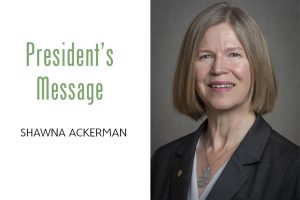By Ken Kent
The actuaries I have worked with, both in my professional career and as a volunteer, are far more creative than our publics might realize. Often when I have held meetings with member volunteers to help address an issue, the final result is a set of principles because the number of viable practical solutions can be quite diverse. But we can all agree on what we are trying to achieve in principle. As a result, the Academy has often created interactive tools for public use in understanding and applying the principles around specific challenges facing the public.
These tools allow us to illustrate that the Academy’s objective and unbiased analysis—whether to leaders and lawmakers or in our regular output of issue briefs, public policy papers, and practice notes across all practice areas—is an effective way to continue to build public trust. In a world rife with uncertainty, the actuarial profession has an outstanding reputation as providers of information and analysis that the public and policymakers can rely on to be accurate, supported by facts (and of course, figures), and a nonpartisan perspective in an often partisan environment. And, much of what we do is provide information so those responsible for decision-making have an opportunity to explore issues based on actuarial principles.
One way we serve the public is by providing easy-to-use, interactive tools that help illustrate ways to look at issues based on an actuarial perspective. In so doing, we support the public and maintain their trust by allowing for an unbiased view of exploring solutions for public challenges.
The latest update of one of these tools is the topic of this issue of Contingencies’ cover story—the Social Security Challenge, a public-facing experience that tackles and makes understandable some of the funding concerns about the universally popular almost-90-year-old federal program. The Social Security Game—the previous incarnation of the Challenge—has been a longstanding destination on our website at actuary.org. The tool allows for exploring solutions to Social Security through the various alternative solutions. Along with the Challenge, the Academy’s many Social Security papers and issue briefs—most recently on Social Security reform, including benefit and taxation options, released last August; the ongoing Essential Elements series, “Securing Social Security,” most recently updated last June; and reports on and analysis of the annual Social Security Trustees Report—are also available resources for considerable thought on how to address the continuation of benefits at the current levels defined by law. Look for a monograph on Social Security and disadvantaged populations soon that will incorporate elements of diversity, equity & inclusion—a topic at the forefront of many of the Academy’s 2023 public policy efforts.
Other tools designed to help the public include the Actuaries Longevity Illustrator, developed jointly by the Academy and the Society of Actuaries (SOA). The illustrator’s easy-to-use interface produces tables and graphs showing the likelihood that you—and your spouse/partner, if applicable—may live to a certain age, thereby helping the public understand potential retiree financial longevity risk.
The Actuaries Climate Index—co-sponsored by the Academy, the SOA, the Canadian Institute of Actuaries, and the Casualty Actuarial Society—along with the Academy-developed Actuaries Climate Research Index offer timely, periodic updates on climate risk and change, and how this important issue affects the public and the environment. Members of the public can key in on the areas they live; there’s nothing quite like seeing your region in a spotlight to drive home the message of climate change.
As we move into spring, it is the time when the Academy undergoes an annual ritual of “Hill Visits”—when our volunteer members meet with federal lawmakers and policymakers on Capitol Hill in Washington, discussing and offering our objective analysis on a host of important public policy issues. These tools are welcome topics of interest to the federal government, and Academy volunteers can highlight our work and reference our website, pointing lawmakers to these tools to explore the implications of alternative solutions to the legislative challenges they are addressing.
The Academy is pleased to have these tools available to the public to reflect the creativity and thought behind actuarial considerations that impact all Americans at one level or another. They help distill complex actuarial concepts down to their essence—what they mean for the everyday American. By developing these tools, the Academy has taken another step in fostering trust among the public it serves.
COQ Seeks Your Input for Webinar on Qualifications
The Committee on Qualifications (COQ) is seeking input—in the form of questions and comments—to help the COQ develop a webinar on qualifications, including changes to the Qualification Standards for Actuaries Issuing Statements of Actuarial Opinion in the United States that took effect Jan. 1, 2022. One of the major changes was the additional requirement of 1 hour of bias training annually; it is expected that this topic will be covered at the webinar. Have a question you’d like answered? Send it to professionalism@actuary.org.





